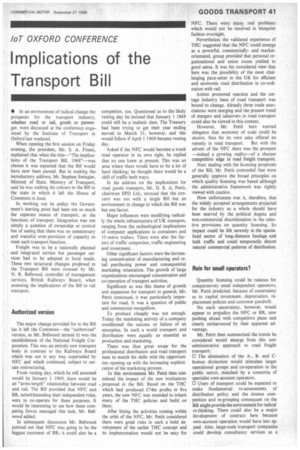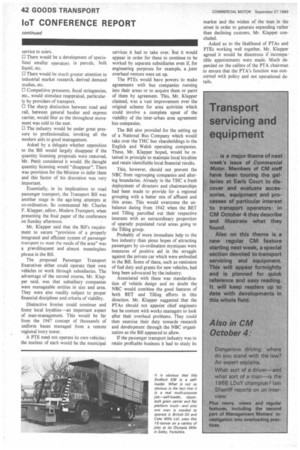loT OXFORD CONFERENCE
Page 43

Page 44

If you've noticed an error in this article please click here to report it so we can fix it.
Implications of the Transport Bill
• In an environment of radical change the prospects for the transport industry, whether road or rail, goods or passenger, were discussed at the conference organized by the Institute of Transport in Oxford last weekend.
When opening the first session on Friday evening, the president, Mr. S. A. Finnis, explained that when the title—"The implica tions of the Transport Bill, 1968"—was chosen it was expected that the Bill would have now been passed. But in making theintroductory address, Mr. Stephen Swingler, Minister of State, Ministry of Transport, said he was nailting his colours to the Bill in the state in which it left the House of Commons in June.
In working out its policy the Government's starting point had been not so much the separate means of transport, as the functions of transport. Integration was not simply a question of ownership or control but of seeing that there was no unnecessary and wasteful over-provision of capacity to meet each transport function.
Freight was to be a nationally planned and integrated service but passenger ser vices had to be adopted to local needs.
These two structural changes proposed in the Transport Bill were stressed by Mr.
N. R. Bellwood, controller of management services, British Railways Board, when assessing the implications of the Bill to rail transport.
Authorized version
The major change provided for in the Bill (as it left the Commons—the "authorized" version, as Mr. Bellwood termed it) was the establishment of the National Freight Corporation. This was an entirely new transport body in contrast to the Railways Board which was not in any way superseded by NFC and which continued, subject to certain restructuring.
Froth vesting day, which he still assumed would be January 1 1969, there would be an "arms-length" relationship between road and rail. The Bill provided that NFC and BR, notwithstanding their independent roles, were to co-operate for these purposes. It would be interesting to see how these competing forces managed this task, Mr. Bellwood added.
In subsequent discussion Mr. Bellwood pointed out that NFC was going to be the biggest customer of BR; it could also be a competitor, too. Questioned as to the likely vesting day he insisted that January 1 1969 could still be a realistic date. The Treasury had been trying to get their year ending moved to March 31, however, and this would follow if April 1 1969 became vesting day.
Asked if the NFC would become a trunk road operator in its own right, he replied that no one knew at present. This was an area where there would have to be a lot of hard thinking; he thought there would be a shift of traffic both ways.
In his address on the implications for road goods transport, Mr. D. E. A. Pettit, chairman SPD Ltd., stressed that the concern was not with a single Bill but an environment in change in which the Bill was but one factor.
Major influences were modifying radically the whole infrastructure of UK transport, ranging from the technological implications of computer applications to containers and 15-metre trailers. There were also the factors of traffic congestion, traffic engineering and investment.
Other significant factors were the increasing concentration of manufacturing and retail purchasing power and consequential marketing orientation. The growth of large organizations encouraged concentration and co-operation of transport activities.
Significant as was this theme of growth and expansion for transport in general, Mr. Pettit continued, it was particularly important for road. It was a question of public and commercial recognition.
To produce cheaply was not enough. Today the marketing activity of a company conditioned the success or failure of an enterprise. In such a world transport and distribution were equally as essential as production and marketing.
There was thus great scope for the professional distribution and road transport man to match his skills with the opportunities opening up with the increasing sophistication of the marketing process.
In this environment Mr. Pettit then considered the impact of the new institutions . proposed in the Bill. Based on the THC which had produced £74m profits in five years, the new NFC was intended to inherit many of the THC policies and build on them.
After listing the activities coming within the orbit of the NFC, Mr. Pettit considered there were great risks in such a bold development of the earlier THC concept and its implementation would not be easy for NFC. There were many real problems which would not be resolved in blueprint fashion overnight.
Nevertheless the validated experience of THC suggested that the NFC could emerge as a powerful, commerciallyand marketorientated, group provided that personal organizational and union issues yielded to good sense. It was his considered view that here was the possibility of the most challenging pace-setter in the UK for efficient and economic road distribution in co-ordination with rail.
Action promoted reaction and the cottage industry base of road transport was bound to change. Already three trade associations were merging and the present trend of mergers and takeovers in road transport could also be viewed in this context.
However, Mr. Pettit here warned delegates that economy of scale could be elusive. Size for its own sake offered no remedy in road transport. But with the advent of the NFC there was the prospect —indeed a growing reality—of a sharper competitive edge in road freight transport.
Next dealing with the licensing proposals of the Bill, Mr. Pettit contended that most generally approve the broad principles on which quality licensing was based although the administrative framework was rightly viewed with caution.
How unfortunate was it, therefore, that the widely accepted arrangements projected for the industry as a whole should have been marred by the political dogma and non-commercial discrimination in the selective provisions on quantity licensing. Its impact could be felt ,severely in the specialized sector of long-distance haulage and bulk traffic and could temporarily distort natural commercial patterns of distribution.
Ruin for small operators?
Quantity licensing could be ruinous for comparatively small independent operators, Mr. Pettit predicted, because of uncertainty as to capital investment, depreciation, replacement policies and customer goodwill.
No such uncertainty, however, would appear to prejudice the NFC or BR, now pushing ahead with competitive plans and clearly embarrassed by their apparent advantage.
Mr. Pettit then summarized the trends he considered would emerge from this new administrative approach to road freight transport: 0 The elimination of the A-, Band Clicence distinction would stimulate larger operational groups and co-operation in the public sector, matched by a consortia of specialist own-account operators.
0 Users of transport could be expected to make fundamental re-assessments of distribution policy and the intense competition and re-grouping consequent on the Bill might provide the environment for radical re-thinking. There could also be a major development of contract here because own-account operation would have less appeal. Also, large-scale transport companies could develop consultancy services as a service to users.
0 There would be a development of specialized smaller operators in parcels, bulk liquid. etc.
0 There would be much greater attention to industrial market research, derived demand studies, etc.
El Competitive pressures, fiscal stringencies, etc., would stimulate reappraisal, particularly by providers of transport.
0 The sharp distinction between road and rail, between general haulier and express carrier, would blur as the throughout movement was sold to the user.
0 The industry would be under great pressure to professionalize, invoking all the modern aids to good management.
Asked by a delegate whether opposition to the Bill would largely disappear if the quantity licensing proposals were removed, Mr. Pettit considered it would. He thought quantity licensing would "disappear". There was provision for the Minister to defer them and this factor of his discretion was very important.
Essentially, in its implications to road passenger transport, the Transport Bill was another stage in the age-long attempts at co-ordination. So commented Mr. Charles F. Klapper, editor, Modern Transport, when presenting the final paper of the conference on Sunday afternoon.
Mr. Klapper said that the Bill's requirement to secure "provision of a properly integrated and efficient system of passenger transport to meet the needs of the area" was a grandiloquent and almost meaningless phrase in the Bill.
The proposed Passenger Transport Executives either could operate their own vehicles or work through subsidiaries. The advantage of the second course, Mr. Klapper said, was that subsidiary companies were manageable entities in size and area. They were also readily subject to proper financial disciplines and criteria of viability.
Distinctive liveries could continue and foster local loyalties—an important aspect of man-management. This would be far from the 1947 concept of thousands of uniform buses managed from a remote regional ivory tower.
A PTE need not operate its own vehicles: the nucleus of each would be the municipal
services it had to take over. But it would appear in order for these to continue to be worked by separate subsidiaries even if, for engineering purposes for example, a joint overhaul venture were set up.
The PTEs would have powers to make agreements with bus companies running into their areas or to acquire them or parts of them by agreement. This, Mr. !Clapper claimed, was a vast improvement over the original scheme for area activities which could involve a complete upset of the viability of the inter-urban area agreement bus companies.
The Bill also provided for the setting up of a National Bus Company which would take over the THC bus shareholdings in the English and Welsh operating companies. These, Mr. Klapper hoped, would be retained in principle to maintain local loyalties and retain identifiable local financial results.
This, however, should not prevent the NBC from regrouping companies and altering boundaries. Already in the THC a fresh deployment of directors and chairmanships had been made to provide for a regional grouping with a better mix of affluent and thin areas. This would overcome the unbalance dating from 1942 when the BET and Tilling parcelled out their respective interests with an extraordinary proportion of sparsely populated rural areas going to the Tilling group.
Probably of more immediate help to the bus industry than pious hopes of attracting passengers by co-ordination mystiques were measures of positive aid in the struggle against the private car which were embodied in the Bill. Some of these, such as remission of fuel duty and grants for new vehicles, had long been advocated by the industry.
Associated with these was standardization of vehicle design and no doubt the NBC would combine the good features of both BET and Tilling efforts in this direction. Mr. Klapper suggested that the PTAs should not appoint chief engineers but be content with works managers to look after their overhaul problems. They could then exercise their duty towards research and development through the NBC organization as the Bill appeared to allow.
If the passenger transport industry was to retain profitable business it had to study its market and the wishes of the man in the street in order to generate expanding rather than declining customs, Mr. Klapper concluded.
Asked as to the likelihood of PTAs and PTEs working well together. Mr. Klapper agreed it would be disastrous if incompatible appointments were made. Much depended on the calibre of the PTA chairman to ensure that the PTA's function was concerned with policy and not operational details.
































































































































































































